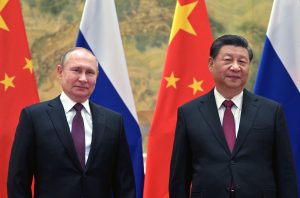This is not the first time that Russia has seemingly timed an invasion to coincide with an Olympic Games in China: It invaded Georgia just as the 2008 Beijing Olympics were getting underway. In fact, the Russian annexation of Crimea also occurred during the 2014 Sochi Olympics.
Although it is possible that Chinese President Xi Jinping was told about the Russian invasion of Ukraine in advance, it is nonetheless likely that Xi now finds himself forced to modify a range of policies – short, medium and long term – in a range of areas. Indeed, Beijing may even need to fundamentally rethink its domestic and foreign policies, most notably its policy towards the United States.
To start with the very short term, Russian military action is the mother of all distractions from the Beijing 2022 Paralympic Winter Games, while the IPC’s decision not to allow Russian and Belarusian athletes to participate even as individuals has created serious issues for the organizers. There have been reports that Xi asked Putin to hold off on invading until after the Games, which would likely have meant both the Olympics and the Paralympics. Given Russian stringency with linguistic definitions, however, it is quite possible that the Kremlin interpreted this as referring only to the Olympics.
Second, China feels that the rest of the world is increasingly lumping China and Russia together, given the belief that China knew about the invasion of Ukraine in advance as well as the widespread perception that China is supporting Russia to some extent. The Chinese can’t rebuff Moscow completely since Russia is a key strategic partner, so it will offer the Russians some consideration, but China also has strong ties with Ukraine, as evident in the Statement on the Provision of Security Guarantees for Ukraine (December 1994) and the Treaty on Friendship and Cooperation Between China and Ukraine (concluded in 2013, ratified in 2015).
Moreover, while Beijing can work together with Moscow in opposition to Western values such as democracy and freedom, China does still adhere to the Five Principles of Peaceful Coexistence (1954), which makes it hard to come out in support of any infringement of sovereignty. The West opposes Russia along the lines of totalitarianism versus democracy, rather than on the basis of the validity of any infringement of sovereignty. Western criticism of totalitarianism increasingly employs the logic of seeing infringements on sovereignty as something that totalitarian states do. However, the Chinese want to convey that although Western democracy does not apply to them, they still respect sovereignty. For the time being, this is likely to motivate the Chinese to combine some support for Russia with steps to highlight their differences. This balancing act can be seen reflected in China’s decision to abstain from voting on the UN resolution against the Ukraine invasion, rather than offering Russia an outright “No” vote.
I suspect that the West will begin to treat China and Russia as the same based on this tendency to equate totalitarianism with infringements on sovereignty. One key will be whether China can successfully insulate itself from this perception. It is likely that China would rather detach the issue of sovereignty from values like democracy and freedom. This also leads to the question of how to avoid economic sanctions. China will want to show the world that its stance differs from that of, say, Belorussia, all the while acquiescing to Russian requests for cooperation to some degree.
Third, Russia’s invasion of Ukraine has introduced uncertainty with regard to the start of Xi Jinping’s third term as a General Secretary of the Party or his election as Chairman of the Party at the Communist Party’s 20th party congress in the fall of 2022. It also complicates Xi’s international position. There are those who will want to link China’s designs on Taiwan with the war in Ukraine, so China will need to be careful in conveying its position on Taiwan.
Finally, there is the question of Xi’s long-term vision of a shift from multipolarity to U.S.-China bipolarity and then to China surpassing the U.S. by 2049 and exactly how realistic it is. This is China’s grand design, but the war in Ukraine might well have upended it. Russia’s military actions in Chechnya and Crimea naturally prompted an international reaction, but hardly transformed the world order. Its invasion of Ukraine might. Much will depend on how the conflict unfolds, but it may well be that Xi needs to rethink his grand design.

































